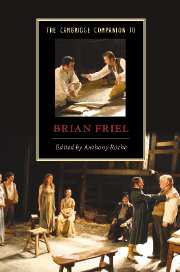Book contents
- Frontmatter
- 1 Introduction
- 2 The early plays
- 3 Surviving the 1960s: three plays by Brian Friel 1968-1971
- 4 Friel and the Northern Ireland “Troubles” play
- 5 Family affairs: Friel’s plays of the late 1970s
- 6 Five ways of looking at Faith Healer
- 7 Translations, the Field Day debate and the re-imagining of Irish identity
- 8 Dancing at Lughnasaand the unfinished revolution
- 9 The late plays
- 10 Friel’s Irish Russia
- 11 Friel and performance history
- 12 Friel’s dramaturgy: the visual dimension
- 13 Performativity, unruly bodies and gender in Brian Friel’s drama
- 14 Brian Friel as postcolonial playwright
- Bibliography
- Index
2 - The early plays
Published online by Cambridge University Press: 28 January 2007
- Frontmatter
- 1 Introduction
- 2 The early plays
- 3 Surviving the 1960s: three plays by Brian Friel 1968-1971
- 4 Friel and the Northern Ireland “Troubles” play
- 5 Family affairs: Friel’s plays of the late 1970s
- 6 Five ways of looking at Faith Healer
- 7 Translations, the Field Day debate and the re-imagining of Irish identity
- 8 Dancing at Lughnasaand the unfinished revolution
- 9 The late plays
- 10 Friel’s Irish Russia
- 11 Friel and performance history
- 12 Friel’s dramaturgy: the visual dimension
- 13 Performativity, unruly bodies and gender in Brian Friel’s drama
- 14 Brian Friel as postcolonial playwright
- Bibliography
- Index
Summary
The early work of a playwright may display surprising misdirection. But, even then, there may be signals towards the mature work to follow. A playwright of substance creates an alternative world on stage, a world with its own population, its own modes of behavior, its own style and, in particular, its own characteristic stage speech. All of this is constructed with the actor in mind. It is extremely unlikely that such a world will already be in place in the first written plays. There is also the endearing fact that young writers tend to find their own personal experiences of consuming interest and hence the echoes in early work of personal journeys. There is a danger here for the playwright, since plays depend upon an effacement of the personal, a projection of the personal into multiple roles or, as in the case of Shaw or Brecht, upon the assertive expression of personality through a subjective control of the material.
Stephen Greenblatt remarks how Shakespeare, in his first attempt at writing an historical trilogy with Henry VI in the 1590s, creates a gang of lower-class rebels from the countryside, led by Jack Cade, who attempt a proletarian revolution. Greenblatt's point is that Shakespeare himself had just recently moved to London from the provinces. He is offering his metropolitan audience a personal version of terror, of the quaking instability beneath the façade of Elizabethan order. Certainly, Cade and his men have the immediacy of closely observed life, of overheard speech, which is not true of the aristocratic characters in those three early plays. There is a comparable reflection of journeying in the first play of another non-metropolitan playwright in George Farquhar's Love and a Bottle (1698). Farquhar's journey from Ireland to London was one from the periphery to the center, the typical journey of the outsider from the colony to the center of power and social definition, typical, that is to say, of the journey made by most Anglo-Irish playwrights of the eighteenth and nineteenth centuries.
- Type
- Chapter
- Information
- The Cambridge Companion to Brian Friel , pp. 6 - 17Publisher: Cambridge University PressPrint publication year: 2006
- 2
- Cited by



